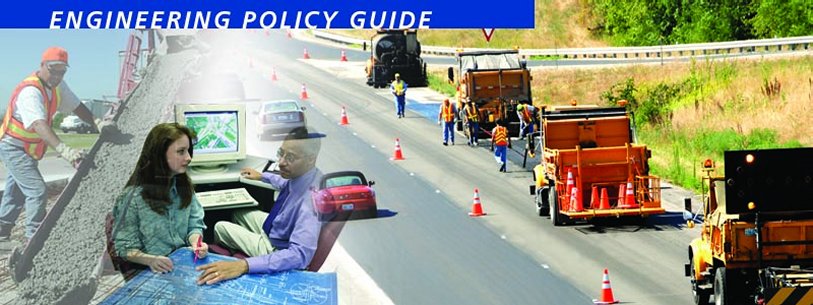Main Page: Difference between revisions
No edit summary |
mNo edit summary |
||
| Line 13: | Line 13: | ||
|valign="top" cellspacing="0" cellpadding="5" style="border: 1px solid #FFA500; background:#ffdead"|'''[[:Category:137 Construction Inspection Guidance for Records to be Maintained|Construction Inspection Guidance for Records to be Maintained]]''' | |valign="top" cellspacing="0" cellpadding="5" style="border: 1px solid #FFA500; background:#ffdead"|'''[[:Category:137 Construction Inspection Guidance for Records to be Maintained|Construction Inspection Guidance for Records to be Maintained]]''' | ||
12/04/2008: Guidance for archiving change orders has been modified. Change order copies that | 12/04/2008: Guidance for archiving change orders has been modified. Change order copies that contain original signatures will now reside in the Resident Engineers project file. | ||
'''[[Media:616.2.1 Road Closed Beyond.pdf|Typical Detour Figure]]''' | '''[[Media:616.2.1 Road Closed Beyond.pdf|Typical Detour Figure]]''' | ||
Revision as of 08:26, 8 December 2008

| RECENT POLICY CHANGES IN THE EPG | |
| MoDOT has made great strides to build a good transportation system and increase taxpayers' trust in its ability to deliver what was promised. The same innovative concepts such as practical design and design-build that were used to deliver those commitments, have made MoDOT a leader in the transportation industry. These forward thinking, innovative concepts were continued with the decision to incorporate all MoDOT's engineering manuals under a single cover.
MoDOT is proud to present the new ENGINEERING POLICY GUIDE. This document is the result of a yearlong effort to combine the Right of Way, Design, Bridge, Construction, Traffic and Maintenance Manuals; providing a single reference for all engineering guidance. MediaWiki, the engine behind the Wikipedia on the World Wide Web, is the software used to deliver the new manual. A small HELP ARTICLE is included to assist you with some helpful hints on how to use the manual as well as other points of interest. This HELP ARTICLE will be expanded as questions arise. You will find this format easy to navigate and more pleasing to read. |
Construction Inspection Guidance for Records to be Maintained
12/04/2008: Guidance for archiving change orders has been modified. Change order copies that contain original signatures will now reside in the Resident Engineers project file. 11/3/08: The typical detour figure, sheet 2 of 4, has been revised to clarify payment of detour signs. 616.13.2 Temporary One-Lane, Two-Way Operations 10/28/08: Contractors may opt to use portable flagger device control in lieu of current flagger control options for 2-lane highways. Operator’s Guide for Anti-Icing 10/28/08: Printable versions (pdfs) of the tables in 133.5 Operator’s Guide for Anti-Icing are now available. LETS 10/2/08: The Local Exchange of Transportation Services (LETS) article has been updated. Typical Applications for Traffic Control 9/25/08: Printable versions (pdfs) of Typical Applications for Traffic Control are now available in 616.23 Traffic Control for Field Operations. Labor Compliance 9/23/08: Guidance for conducting payroll reviews and wage rate interviews in 135.5 Labor Compliance has been rewritten to more clearly explain the requirements. Highway Safety Plan and Performance Plan 8/27/08: 132.4 Highway Safety Plan and Performance Plan describes how Missouri’s Section 402 State and Community Highway Safety Program grant will be used to promote highway safety. 2008 Roadway Visibility Direction 8/20/08: The provisions of the 2008 Roadway Visibility Direction have been fully incorporated into 620 Pavement Marking in 620.1 General (MUTCD Chapter 3A) and 620.2 Pavement and Curb Markings (MUTCD Chapter 3B). Contract Plans Addendum Process 8/20/08: New guidance, 237.9.6 Electronic Plans PS&E Submittal Guidelines and 103.1.6.6.1 Identification of Revisions in Addendums, for districts on how to show changes within an addendum to eliminate confusion when the contractors receive revised plans. Increased spacing between FRESH OIL/LOOSE GRAVEL and NO CENTER LINE STRIPE signs 8/20/08: In 616.23.2.5.7 Pavement Markings, the distance between NO CENTER STRIPE and FRESH OIL/LOOSE GRAVEL signs was increased to two miles to reduce costs while providing acceptable service. 616.14.8 Significant Projects Definition 8/20/08: The definition of a significant project was amended to reduce the burden on district staff by eliminating the TMP requirement on projects with minor impacts to traffic. Railroad Crossing Median Islands 8/11/08: This new section provides guidance for the use of median islands in conjunction with automated warning signals and gates at railroad crossings on low speed two lane roadways. These islands are required for the establishment of "Quiet Zones". Inspections Based on Non-MoDOT Specifications 8/8/08: This new article provides guidance for MoDOT inspectors using non-MoDOT specifications during inspections or while administering contracts. Changeable Message Signs (CMS) 7/30/08: Changeable Message Sign guidance was simplified so that guidance for non-temporary traffic control for CMSs along freeways and expressways now defers to Dynamic Message Sign guidance. Use of "Approximate station for land survey lines" on Plans 7/23/08: Removed the requirement (236.13.1.8 ) for the use of approximate station with plus to be shown for land survey lines on the plans. Right of Way Procedure 7/17/08: Revised procedure (236.13.1.13 Designing Right of Way Plans) for the e-mail transmittal of Right of Way Plans to Design. Aviation 7/3/08: Aviation links to the programs and services provided by the aviation section of Multimodal Operations. Processing Reclaimed Asphalt 6/18/08: Guidelines were added for Hot In-Place Recycling, which is becoming a viable rehabilitation strategy. Prime Coat 6/18/08: The thickness of pavement requiring a prime coat has been reduced to less than 3-3/4 inches. |